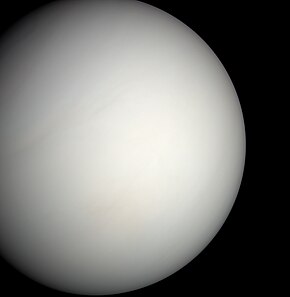Sukhrgrah
(Venus se bheja gais)
Sukhrgrah (pratiik: ![]() ) Saur Mandal (Solar System) me suraj se duur duusra planet hae.
) Saur Mandal (Solar System) me suraj se duur duusra planet hae.
 True colour image of Venus, as captured by MESSENGER. A cloud layer permanently obscures the surface. | |||||||||||||||||
| Designations | |||||||||||||||||
|---|---|---|---|---|---|---|---|---|---|---|---|---|---|---|---|---|---|
| Pronunciation | Lua waala galti: expandTemplate: template "Template:IPA audio link" does not exist. | ||||||||||||||||
Named after | Roman goddess of love (see goddess Venus) | ||||||||||||||||
| Adjectives | Venusian /vɪˈnjuːziən, -ʒən/, rarely Cytherean /sɪθəˈriːən/[1] or Venerean / Venerian /vɪˈnɪəriən/[2] https://hif.wikipedia.org/wiki/Temperature | ||||||||||||||||
| Symbol | |||||||||||||||||
| Orbital characteristics | |||||||||||||||||
| Epoch J2000 | |||||||||||||||||
| Aphelion | 0.728213 AU (108.94 million km) | ||||||||||||||||
| Perihelion | 0.718440 AU (107.48 million km) | ||||||||||||||||
| 0.723332 AU (108.21 million km) | |||||||||||||||||
| Eccentricity | 0.006772 | ||||||||||||||||
| 583.92 days | |||||||||||||||||
Average orbital speed | 35.02 km/s | ||||||||||||||||
| 50.115° | |||||||||||||||||
| Inclination |
| ||||||||||||||||
| 76.680° | |||||||||||||||||
| 54.884° | |||||||||||||||||
| Satellites | None | ||||||||||||||||
| Physical characteristics | |||||||||||||||||
Mean radius |
| ||||||||||||||||
| Flattening | 0 | ||||||||||||||||
| |||||||||||||||||
| Volume |
| ||||||||||||||||
| Mass |
| ||||||||||||||||
Mean density | 5.243 g/cm3 | ||||||||||||||||
| 8.87 m/s2 (0.904 g0) | |||||||||||||||||
| 10.36 km/s (6.44 mi/s) | |||||||||||||||||
| −116.75 d (retrograde)
1 Venus solar day | |||||||||||||||||
| −243.0226 d (retrograde) | |||||||||||||||||
Equatorial rotation velocity | 1.81 m/s | ||||||||||||||||
| 2.64° (for retrograde rotation)Template:Break177.36° (to orbit)Template:Refn | |||||||||||||||||
North pole right ascension |
| ||||||||||||||||
North pole declination | 67.16° | ||||||||||||||||
| Albedo | |||||||||||||||||
| Temperature | 232 K (−41 °C) (blackbody temperature) | ||||||||||||||||
| |||||||||||||||||
| Surface absorbed dose rate | 2.1×10−6 μGy/h | ||||||||||||||||
| Surface equivalent dose rate | 2.2×10−6 μSv/h 0.092–22 μSv/h at cloud level | ||||||||||||||||
| −4.92 to −2.98 | |||||||||||||||||
| −4.4[4] | |||||||||||||||||
| 9.7″–66.0″ | |||||||||||||||||
Duusra websites
badlo- Nine Planets: Venus
- The Planet Venus
- Images of Venus
- Venus Archived 2011-05-20 at the Wayback Machine
- ↑ Template:OED
- ↑ Template:OED
- ↑ Archinal, B. A.; Acton, C. H.; A'Hearn, M. F.; Conrad, A.; Consolmagno, G. J.; Duxbury, T.; Hestroffer, D.; Hilton, J. L. et al. (2018). "Report of the IAU Working Group on Cartographic Coordinates and Rotational Elements: 2015" (in en). Celestial Mechanics and Dynamical Astronomy 130 (3): 22. doi:10.1007/s10569-017-9805-5. ISSN 0923-2958. http://link.springer.com/10.1007/s10569-017-9805-5.
- ↑ "Encyclopedia – the brightest bodies". IMCCE. Archived from the original on 24 July 2023. Retrieved 29 May 2023.